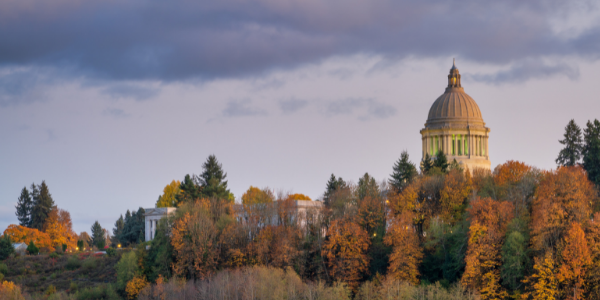
By Willa Jeffers, Washington State Chapter Legislative Organizer
This year’s state legislative session came to a close on March 10th. While there were a few important wins, there were other ways that our lawmakers fell short. Before our recap though, we want to express our appreciation:
Each year, Sierra Club’s work in the state legislature is largely possible because of grassroots volunteer power. And by that measure, this year was one of our strongest ever. Sierra Club volunteers and members sent thousands of text messages and emails and packed sign-in sheets with support for important bills. Plus, our district lobby teams held dozens of meetings with legislators before and during session to lobby for the environment on behalf of Sierra Club.
For everybody that showed up, shared an article, signed in to a hearing, or joined a text bank – thank you!
What are we proud of from this session? Here are a few things:
-
Closing a Sprawl Loophole: SB 5042, closing a sprawl loophole in the Growth Management Act, passed after 14 years of unsuccessful attempts, and will protect our forest and farmland from illegal sprawl and development.
-
Funding for Salmon Recovery: The final budget included more than $120 million in salmon recovery investments, including $375,000 for an essential Snake River Mitigation Study to plan for a transition away from the outmoded and harmful lower Snake River dams.
-
A Modest Step Toward Cleaner Buildings: SB 5722 will help reduce fossil fuel use in buildings by expanding building performance standards to mid-sized buildings.
-
Shifting Our Transportation Investments: A transportation package passed both the House and the Senate and includes investments in public transit, EV infrastructure, cleaner ferries, and removing fish passage barriers.
-
Protecting Eelgrass: SB 5619 takes measures to protect native eelgrass and kelp meadows in the Salish Sea.
Where did the legislature fall short?
-
Updating Our Local Planning to Address Climate: Our state laws governing growth were written 30 years ago and have never been updated to better address the realities of climate change and environmental health disparities. Yet, the legislature failed to pass HB 1099, which would have integrated climate mitigation, resilience, and environmental justice into local comprehensive plans.
-
Addressing Our Housing Crisis: As our region has added jobs in recent years, housing production has failed to keep up - leading to skyrocketing rents and home prices, more sprawl, and longer commutes that exacerbate air pollution and climate change. The legislature failed to take any action to allow more affordable housing types like backyard cottages or duplexes and fourplexes near transit in our urban growth areas.
-
Passing the Lorraine Loomis Act for Salmon Recovery: The funding for salmon projects was strong in the budget, but we still need a regulatory framework to ensure a consistent rise in salmon populations across the state. We have tried voluntary programs for over 20 years, and they have failed to make meaningful changes to the protection of our waterways. We must require restoration of riparian buffers on our most at risk streams so that salmon can survive our summer heat waves.
-
More Action on Clean Buildings: Several bills aimed at reducing fossil fuel use in buildings, including HB 1767 (which would create an optional incentive program for public utilities to support households to switch from electric to gas appliances), were killed by opposition from utilities and industry. Buildings are the largest growing source of greenhouse gas emissions in our state, and we can not allow fossil fuel special interests to stop crucially-needed policies to electrify our buildings and meet our state’s green energy goals.
We need you: Become a Volunteer Lobbyist!
This year, we’re looking to grow our volunteer district lobby team program to cover more legislative districts. We have many openings around the state, including in Seattle, King County, and Pierce County. If you’re interested in learning how to represent Sierra Club in small group meetings with your state senators and representatives to lobby for things like action on housing, building electrification, and salmon recovery, please get in touch!
And if you’d like more frequent email updates on legislative work, you can sign up for those here.